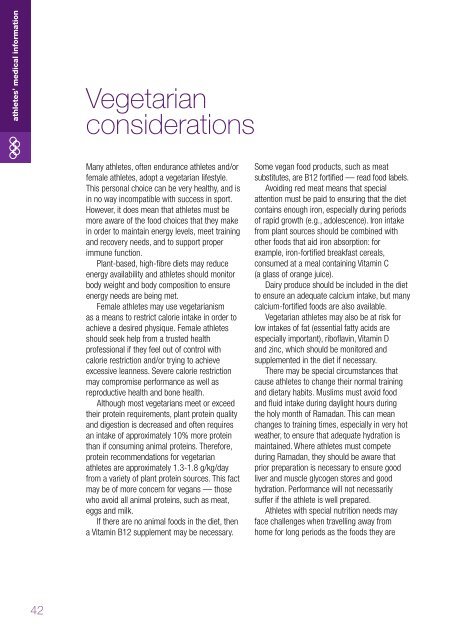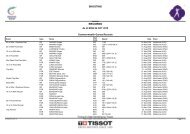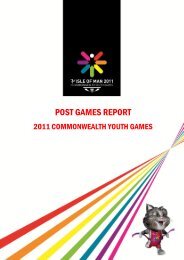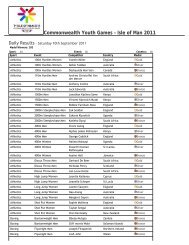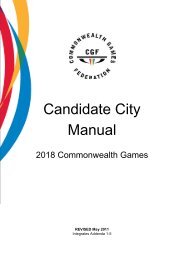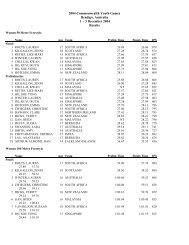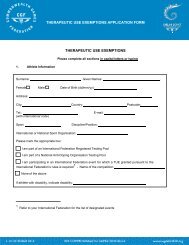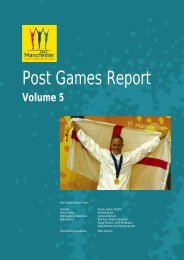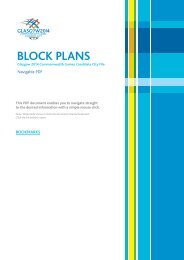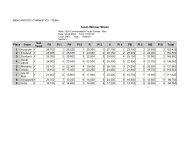Nutrition for Athletes - Commonwealth Games Federation
Nutrition for Athletes - Commonwealth Games Federation
Nutrition for Athletes - Commonwealth Games Federation
Create successful ePaper yourself
Turn your PDF publications into a flip-book with our unique Google optimized e-Paper software.
athletes’ medical in<strong>for</strong>mationVegetarianconsiderationsMany athletes, often endurance athletes and/orfemale athletes, adopt a vegetarian lifestyle.This personal choice can be very healthy, and isin no way incompatible with success in sport.However, it does mean that athletes must bemore aware of the food choices that they makein order to maintain energy levels, meet trainingand recovery needs, and to support properimmune function.Plant-based, high-fibre diets may reduceenergy availability and athletes should monitorbody weight and body composition to ensureenergy needs are being met.Female athletes may use vegetarianismas a means to restrict calorie intake in order toachieve a desired physique. Female athletesshould seek help from a trusted healthprofessional if they feel out of control withcalorie restriction and/or trying to achieveexcessive leanness. Severe calorie restrictionmay compromise per<strong>for</strong>mance as well asreproductive health and bone health.Although most vegetarians meet or exceedtheir protein requirements, plant protein qualityand digestion is decreased and often requiresan intake of approximately 10% more proteinthan if consuming animal proteins. There<strong>for</strong>e,protein recommendations <strong>for</strong> vegetarianathletes are approximately 1.3-1.8 g/kg/dayfrom a variety of plant protein sources. This factmay be of more concern <strong>for</strong> vegans — thosewho avoid all animal proteins, such as meat,eggs and milk.If there are no animal foods in the diet, thena Vitamin B12 supplement may be necessary.Some vegan food products, such as meatsubstitutes, are B12 <strong>for</strong>tified — read food labels.Avoiding red meat means that specialattention must be paid to ensuring that the dietcontains enough iron, especially during periodsof rapid growth (e.g., adolescence). Iron intakefrom plant sources should be combined withother foods that aid iron absorption: <strong>for</strong>example, iron-<strong>for</strong>tified breakfast cereals,consumed at a meal containing Vitamin C(a glass of orange juice).Dairy produce should be included in the dietto ensure an adequate calcium intake, but manycalcium-<strong>for</strong>tified foods are also available.Vegetarian athletes may also be at risk <strong>for</strong>low intakes of fat (essential fatty acids areespecially important), riboflavin, Vitamin Dand zinc, which should be monitored andsupplemented in the diet if necessary.There may be special circumstances thatcause athletes to change their normal trainingand dietary habits. Muslims must avoid foodand fluid intake during daylight hours duringthe holy month of Ramadan. This can meanchanges to training times, especially in very hotweather, to ensure that adequate hydration ismaintained. Where athletes must competeduring Ramadan, they should be aware thatprior preparation is necessary to ensure goodliver and muscle glycogen stores and goodhydration. Per<strong>for</strong>mance will not necessarilysuffer if the athlete is well prepared.<strong>Athletes</strong> with special nutrition needs mayface challenges when travelling away fromhome <strong>for</strong> long periods as the foods they are42


